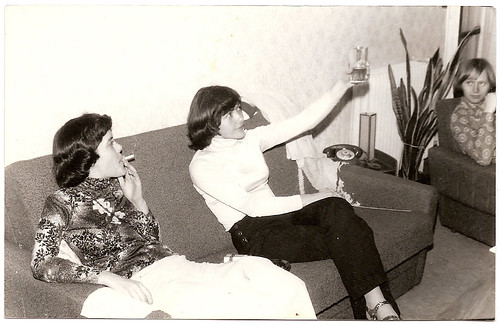Or: a collection found on the street tells the story of minor apparatchiks in love.
Once every couple of months it's big garbage day in my district. This means everyone takes out all the **** they don't want anymore and dumps it on the sidewalk. It's like Queen's Day in Holland, except nobody's selling anything. Mounds of stuff, discarded sofas, broken cupboards, old books, soiled shirts, cardboard boxes and piles of random garbage heaped onto the pavement in clusters.
This means lots of activity. Early in the morning the diggers trek into the neighbourhood. Elderly people, Roma. Stuff gets carted into car trunks, folded into plastic bags. Trabants with trailers that are stacked full take off to the suburbs.
In Holland you had rag and bone men until the sixties or so I think, who would come by to collect stuff that's nowadays hauled off by the municipality's "big trash" service on request. This is like that - just on a really large scale. Mostly it just means a lot of trash you have to circumnavigate when you walk down the street, but at its best, or worst, it has a near-Third World feel. A bony old man pulls a makeshift platform on wheels with cardboard stacked up a meter high down a busy road, passing cars swerving around him.
One of those days, a couple of months ago, we took a walk and rummaged through the piles out of curiosity. Found some dumpy Hungarian textbooks, a couple of novels in seventies covers. And photos. Not once, but twice, we found photos. One pile of photos sprawled over the pavement in Nyár utca, dirtied by shoes, some still shoved into a box along with other papers; postcards too, Christmas cards, holiday greetings from Slovakia. The other, larger pile at the beginning of Dohany Street, across from the synagogue, in a box in between newspapers, random stuff.
Budapest and Dunaújváros
I've dubbed the first collection "The apparatchik". These photos belonged to a couple called Lajos and Zsuzsa Dömötör (I googled them, but found no leads). I assumed at first that Lajos had been a minor official, back under the old regime - but going through the photos and translating the texts of postcards with the help of fellow Flickr members (in particular GCsanadi), it turns out that it was Zsuzsa who must have been the apparatchik. Unfolding the story locked into these photos and postcards turned out to be fascinating - if like me, you're the kind of person who finds fragments from the past's quotidian life the most interesting thing.
Continue reading, view the photos
